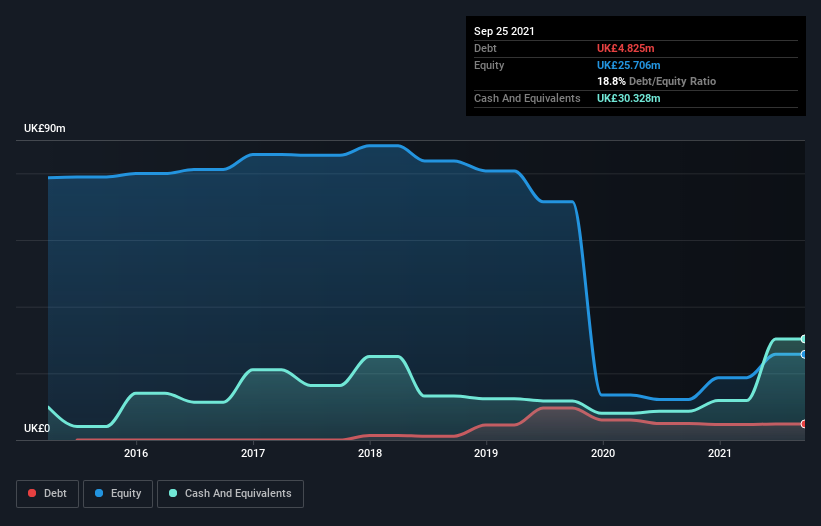Is Mulberry Group (LON:MUL) Using Too Much Debt?
The external fund manager backed by Berkshire Hathaway's Charlie Munger, Li Lu, makes no bones about it when he says 'The biggest investment risk is not the volatility of prices, but whether you will suffer a permanent loss of capital.' So it might be obvious that you need to consider debt, when you think about how risky any given stock is, because too much debt can sink a company. We can see that Mulberry Group plc (LON:MUL) does use debt in its business. But the more important question is: how much risk is that debt creating?
Why Does Debt Bring Risk?
Debt assists a business until the business has trouble paying it off, either with new capital or with free cash flow. Part and parcel of capitalism is the process of 'creative destruction' where failed businesses are mercilessly liquidated by their bankers. However, a more frequent (but still costly) occurrence is where a company must issue shares at bargain-basement prices, permanently diluting shareholders, just to shore up its balance sheet. Of course, plenty of companies use debt to fund growth, without any negative consequences. The first thing to do when considering how much debt a business uses is to look at its cash and debt together.
Check out our latest analysis for Mulberry Group
What Is Mulberry Group's Net Debt?
As you can see below, Mulberry Group had UK£4.83m of debt, at September 2021, which is about the same as the year before. You can click the chart for greater detail. However, its balance sheet shows it holds UK£30.3m in cash, so it actually has UK£25.5m net cash.
How Healthy Is Mulberry Group's Balance Sheet?
According to the last reported balance sheet, Mulberry Group had liabilities of UK£44.4m due within 12 months, and liabilities of UK£60.8m due beyond 12 months. Offsetting these obligations, it had cash of UK£30.3m as well as receivables valued at UK£13.2m due within 12 months. So it has liabilities totalling UK£61.7m more than its cash and near-term receivables, combined.
Mulberry Group has a market capitalization of UK£179.6m, so it could very likely raise cash to ameliorate its balance sheet, if the need arose. However, it is still worthwhile taking a close look at its ability to pay off debt. Despite its noteworthy liabilities, Mulberry Group boasts net cash, so it's fair to say it does not have a heavy debt load!
We also note that Mulberry Group improved its EBIT from a last year's loss to a positive UK£18m. When analysing debt levels, the balance sheet is the obvious place to start. But it is Mulberry Group's earnings that will influence how the balance sheet holds up in the future. So if you're keen to discover more about its earnings, it might be worth checking out this graph of its long term earnings trend.
Finally, a business needs free cash flow to pay off debt; accounting profits just don't cut it. While Mulberry Group has net cash on its balance sheet, it's still worth taking a look at its ability to convert earnings before interest and tax (EBIT) to free cash flow, to help us understand how quickly it is building (or eroding) that cash balance. Happily for any shareholders, Mulberry Group actually produced more free cash flow than EBIT over the last year. That sort of strong cash conversion gets us as excited as the crowd when the beat drops at a Daft Punk concert.
Summing up
While Mulberry Group does have more liabilities than liquid assets, it also has net cash of UK£25.5m. And it impressed us with free cash flow of UK£31m, being 172% of its EBIT. So we are not troubled with Mulberry Group's debt use. When analysing debt levels, the balance sheet is the obvious place to start. However, not all investment risk resides within the balance sheet - far from it. For example - Mulberry Group has 1 warning sign we think you should be aware of.
At the end of the day, it's often better to focus on companies that are free from net debt. You can access our special list of such companies (all with a track record of profit growth). It's free.
Have feedback on this article? Concerned about the content? Get in touch with us directly. Alternatively, email editorial-team (at) simplywallst.com.
This article by Simply Wall St is general in nature. We provide commentary based on historical data and analyst forecasts only using an unbiased methodology and our articles are not intended to be financial advice. It does not constitute a recommendation to buy or sell any stock, and does not take account of your objectives, or your financial situation. We aim to bring you long-term focused analysis driven by fundamental data. Note that our analysis may not factor in the latest price-sensitive company announcements or qualitative material. Simply Wall St has no position in any stocks mentioned.

 Yahoo Finance
Yahoo Finance 
